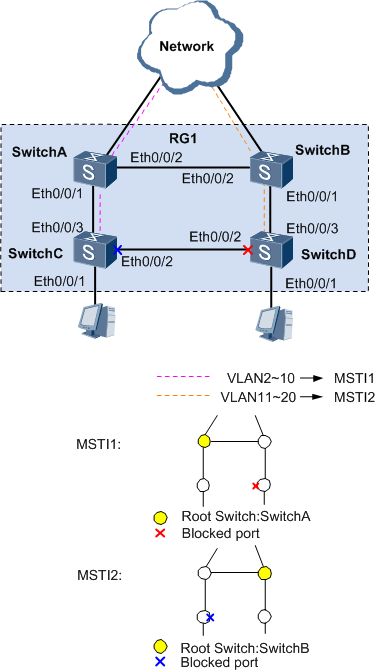华为mstp配置实例
- 配置MSTP功能示例
- 组网需求
- 在一个复杂的网络中,由于冗余备份的需要,网络规划者一般都倾向于在设备之间部署多条物理链路,其中一条作为主用链路,其他作为备份链路。这样就难免会形成环路,若网络中存在环路,可能会引起广播风暴和MAC表项被破坏。为此,可以在网络中部署MSTP协议预防环路。MSTP可阻塞二层网络中的冗余链路,将网络修剪成树状,达到消除环路的目的。
- 如图9-7所示,SwitchA、SwitchB、SwitchC和SwitchD都运行MSTP。为实现VLAN2~VLAN10和VLAN11~VLAN20的流量负载分担,MSTP引入了多实例。MSTP可设置VLAN映射表,把VLAN和生成树实例相关联。
- 图9-7 配置MSTP功能组网图
- 配置思路
- 采用以下思路配置MSTP功能:
- 在处于环形网络中的交换设备上配置MSTP基本功能。与PC相连的端口不用参与MSTP计算,将其设置为边缘端口。
- 配置保护功能,实现对设备或链路的保护。例如:在各实例的根桥设备指定端口配置根保护功能。
- 配置设备的二层转发功能。
- 操作步骤
- 配置MSTP基本功能
- 配置SwitchA、SwitchB、SwitchC和SwitchD到域名为RG1的域内,创建实例MSTI1和实例MSTI2
- 说明:
- 当两台交换设备的以下配置都相同时,这两台交换设备属于同一个MST域。
- MST域的域名。
- 多生成树实例和VLAN的映射关系。
- MST域的修订级别。
- 1.配置SwitchA的MST域。
system-view - [Quidway] sysname SwitchA
- [SwitchA] stp region-configuration
- [SwitchA-mst-region] region-name RG1
- [SwitchA-mst-region] instance 1 vlan 2 to 10
- [SwitchA-mst-region] instance 2 vlan 11 to 20
- [SwitchA-mst-region] active region-configuration
- [SwitchA-mst-region] quit
- 2. 配置SwitchB的MST域。
system-view - [Quidway] sysname SwitchB
- [SwitchB] stp region-configuration
- [SwitchB-mst-region] region-name RG1
- [SwitchB-mst-region] instance 1 vlan 2 to 10
- [SwitchB-mst-region] instance 2 vlan 11 to 20
- [SwitchB-mst-region] active region-configuration
- [SwitchB-mst-region] quit
- 3. 配置SwitchC的MST域。
system-view - [Quidway] sysname SwitchC
- [SwitchC] stp region-configuration
- [SwitchC-mst-region] region-name RG1
- [SwitchC-mst-region] instance 1 vlan 2 to 10
- [SwitchC-mst-region] instance 2 vlan 11 to 20
- [SwitchC-mst-region] active region-configuration
- [SwitchC-mst-region] quit
- 4. 配置SwitchD的MST域。
system-view - [Quidway] sysname SwitchD
- [SwitchD] stp region-configuration
- [SwitchD-mst-region] region-name RG1
- [SwitchD-mst-region] instance 1 vlan 2 to 10
- [SwitchD-mst-region] instance 2 vlan 11 to 20
- [SwitchD-mst-region] active region-configuration
- [SwitchD-mst-region] quit
- 5.在域RG1内,配置MSTI1与MSTI2的根桥与备份根桥
- 配置MSTI1的根桥与备份根桥
- # 配置SwitchA为MSTI1的根桥。
- [SwitchA] stp instance 1 root primary
- # 配置SwitchB为MSTI1的备份根桥。
- [SwitchB] stp instance 1 root secondary
- 配置MSTI2的根桥与备份根桥
- # 配置SwitchB为MSTI2的根桥。
- [SwitchB] stp instance 2 root primary
- # 配置SwitchA为MSTI2的备份根桥。
- [SwitchA] stp instance 2 root secondary
- 6.配置实例MSTI1和MSTI2中将要被阻塞端口的路径开销值大于缺省值
- 说明:
- 端口路径开销值取值范围由路径开销计算方法决定,这里选择使用华为计算方法为例,配置实例MSTI1和MSTI2中将被阻塞端口的路径开销值为20000。
- 同一网络内所有交换设备的端口路径开销应使用相同的计算方法。
- # 配置SwitchA的端口路径开销值的计算方法为华为计算方法。
- [SwitchA] stp pathcost-standard legacy
- # 配置SwitchB的端口路径开销计算方法为华为计算方法。
- [SwitchB] stp pathcost-standard legacy
- # 配置SwitchC的端口路径开销计算方法为华为计算方法,将端口Eth0/0/2在实例MSTI2中的路径开销值配置为20000。
- [SwitchC] stp pathcost-standard legacy
- [SwitchC] interface ethernet 0/0/2
- [SwitchC-Ethernet0/0/2] stp instance 2 cost 20000
- [SwitchC-Ethernet0/0/2] quit
- # 配置SwitchD的端口路径开销计算方法为华为计算方法,将端口Eth0/0/2在实例MSTI1中的路径开销值配置为20000。
- [SwitchD] stp pathcost-standard legacy
- [SwitchD] interface ethernet 0/0/2
- [SwitchD-Ethernet0/0/2] stp instance 1 cost 20000
- [SwitchD-Ethernet0/0/2] quit
- 使能MSTP,实现破除环路
- 设备全局使能MSTP
- # 在SwitchA上启动MSTP。
- [SwitchA] stp enable
- # 在SwitchB上启动MSTP。
- [SwitchB] stp enable
- # 在SwitchC上启动MSTP。
- [SwitchC] stp enable
- # 在SwitchD上启动MSTP。
- [SwitchD] stp enable
- 将与终端相连的端口设置为边缘端口
- # 配置SwitchC端口Eth0/0/1为边缘端口。
- [SwitchC] interface ethernet 0/0/1[SwitchC-Ethernet0/0/1] stp edged-port enable[SwitchC-Ethernet0/0/1] quit
- (可选)配置SwitchC的BPDU保护功能。
- [SwitchC] stp bpdu-protection
- # 配置SwitchD端口Eth0/0/1为边缘端口。
- [SwitchD] interface ethernet 0/0/1[SwitchD-Ethernet0/0/1] stp edged-port enable[SwitchD-Ethernet0/0/1] quit
- (可选)配置SwitchD的BPDU保护功能。
- [SwitchD] stp bpdu-protection
- 说明:
- 如果与边缘端口相连的是使能了STP功能的网络设备,配置BPDU保护功能后,如果边缘端口收到BPDU报文,边缘端口将会被shutdown,边缘端口属性不变。
- 7.配置保护功能,如在各实例的根桥设备的指定端口配置根保护功能
- # 在SwitchA端口Eth0/0/1上启动根保护。
- [SwitchA] interface ethernet 0/0/1
- [SwitchA-Ethernet0/0/1] stp root-protection
- [SwitchA-Ethernet0/0/1] quit
- # 在SwitchB端口Eth0/0/1上启动根保护。
- [SwitchB] interface ethernet 0/0/1
- [SwitchB-Ethernet0/0/1] stp root-protection
- [SwitchB-Ethernet0/0/1] quit
- 8.配置处于环网中的设备的二层转发功能
- 在交换设备SwitchA、SwitchB、SwitchC和SwitchD上创建VLAN2~20
- # 在SwitchA上创建VLAN2~20。
- [SwitchA] vlan batch 2 to 20
- # 在SwitchB上创建VLAN2~20。
- [SwitchB] vlan batch 2 to 20
- # 在SwitchC上创建VLAN2~20。
- [SwitchC] vlan batch 2 to 20
- # 在SwitchD上创建VLAN2~20。
- [SwitchD] vlan batch 2 to 20
- 将交换设备上接入环路中的端口加入VLAN
- # 将SwitchA端口Eth0/0/1加入VLAN。
- [SwitchA] interface ethernet 0/0/1
- [SwitchA-Ethernet0/0/1] port link-type trunk
- [SwitchA-Ethernet0/0/1] port trunk allow-pass vlan 2 to 20
- [SwitchA-Ethernet0/0/1] quit
- # 将SwitchA端口Eth0/0/2加入VLAN。
- [SwitchA] interface ethernet 0/0/2
- [SwitchA-Ethernet0/0/2] port link-type trunk
- [SwitchA-Ethernet0/0/2] port trunk allow-pass vlan 2 to 20
- [SwitchA-Ethernet0/0/2] quit
- # 将SwitchB端口Eth0/0/1加入VLAN。
- [SwitchB] interface ethernet 0/0/1
- [SwitchB-Ethernet0/0/1] port link-type trunk
- [SwitchB-Ethernet0/0/1] port trunk allow-pass vlan 2 to 20
- [SwitchB-Ethernet0/0/1] quit
- # 将SwitchB端口Eth0/0/2加入VLAN。
- [SwitchB] interface ethernet 0/0/2
- [SwitchB-Ethernet0/0/2] port link-type trunk
- [SwitchB-Ethernet0/0/2] port trunk allow-pass vlan 2 to 20
- [SwitchB-Ethernet0/0/2] quit
- # 将SwitchC端口Eth0/0/1加入VLAN。
- [SwitchC] interface ethernet 0/0/1
- [SwitchC-Ethernet0/0/1] port link-type access
- [SwitchC-Ethernet0/0/1] port default vlan 2
- [SwitchC-Ethernet0/0/1] quit
- # 将SwitchC端口Eth0/0/2加入VLAN。
- [SwitchC] interface ethernet 0/0/2
- [SwitchC-Ethernet0/0/2] port link-type trunk
- [SwitchC-Ethernet0/0/2] port trunk allow-pass vlan 2 to 20
- [SwitchC-Ethernet0/0/2] quit
- # 将SwitchC端口Eth0/0/3加入VLAN。
- [SwitchC] interface ethernet 0/0/3
- [SwitchC-Ethernet0/0/3] port link-type trunk
- [SwitchC-Ethernet0/0/3] port trunk allow-pass vlan 2 to 20
- [SwitchC-Ethernet0/0/3] quit
- # 将SwitchD端口Eth0/0/1加入VLAN。
- [SwitchD] interface ethernet 0/0/1
- [SwitchD-Ethernet0/0/1] port link-type access
- [SwitchD-Ethernet0/0/1] port default vlan 11
- [SwitchD-Ethernet0/0/1] quit
- # 将SwitchD端口Eth0/0/2加入VLAN。
- [SwitchD] interface ethernet 0/0/2
- [SwitchD-Ethernet0/0/2] port link-type trunk
- [SwitchD-Ethernet0/0/2] port trunk allow-pass vlan 2 to 20
- [SwitchD-Ethernet0/0/2] quit
- # 将SwitchD端口Eth0/0/3加入VLAN。
- [SwitchD] interface ethernet 0/0/3
- [SwitchD-Ethernet0/0/3] port link-type trunk
- [SwitchD-Ethernet0/0/3] port trunk allow-pass vlan 2 to 20
- [SwitchD-Ethernet0/0/3] quit
- 验证配置结果
- 经过以上配置,在网络计算稳定后,执行以下操作,验证配置结果。
- 说明:
- 本配置举例以实例1和实例2为例,因此不用关注实例0中端口的状态。
-
在SwitchA上执行display stp brief命令,查看端口状态和端口的保护类型,结果如下:
[SwitchA] display stp brief
MSTID Port Role STP State Protection
0 Ethernet0/0/1 DESI FORWARDING ROOT 0 Ethernet0/0/2 DESI FORWARDING NONE 1 Ethernet0/0/1 DESI FORWARDING ROOT 1 Ethernet0/0/2 DESI FORWARDING NONE 2 Ethernet0/0/1 DESI FORWARDING ROOT 2 Ethernet0/0/2 ROOT FORWARDING NONE
在MSTI1中,由于SwitchA是根桥,SwitchA的端口Eth0/0/2和Eth0/0/1成为指定端口。在MSTI2中,SwitchA的端口Eth0/0/1成为指定端口,端口Eth0/0/2成为根端口。
# 在SwitchB上执行display stp brief命令,结果如下:
[SwitchB] display stp brief
MSTID Port Role STP State Protection
0 Ethernet0/0/1 DESI FORWARDING ROOT 0 Ethernet0/0/2 ROOT FORWARDING NONE 1 Ethernet0/0/1 DESI FORWARDING ROOT 1 Ethernet0/0/2 ROOT FORWARDING NONE 2 Ethernet0/0/1 DESI FORWARDING ROOT 2 Ethernet0/0/2 DESI FORWARDING NONE
在MSTI2中,由于SwitchB是根桥,端口Eth0/0/1和Eth0/0/2在MSTI2中成为指定端口。在MSTI1中,SwitchB的端口Eth0/0/1成为指定端口,端口Eth0/0/2成为根端口。
# 在SwitchC上执行display stp interface brief命令,结果如下:
[SwitchC] display stp interface ethernet 0/0/3 brief
MSTID Port Role STP State Protection
0 Ethernet0/0/3 ROOT FORWARDING NONE 1 Ethernet0/0/3 ROOT FORWARDING NONE 2 Ethernet0/0/3 ROOT FORWARDING NONE
[SwitchC] display stp interface ethernet 0/0/2 brief
MSTID Port Role STP State Protection
0 Ethernet0/0/2 DESI FORWARDING NONE 1 Ethernet0/0/2 DESI FORWARDING NONE 2 Ethernet0/0/2 ALTE DISCARDING NONE
SwitchC的端口Eth0/0/3在MSTI1和MSTI2中为根端口。SwitchC的另一个端口Eth0/0/2,在MSTI2中被阻塞,在MSTI1中被计算为指定端口。
# 在SwitchD上执行display stp interface brief命令,结果如下:
[SwitchD] display stp interface ethernet 0/0/3 brief
MSTID Port Role STP State Protection
0 Ethernet0/0/3 ALTE DISCARDING NONE 1 Ethernet0/0/3 ROOT FORWARDING NONE 2 Ethernet0/0/3 ROOT FORWARDING NONE
[SwitchD] display stp interface ethernet 0/0/2 brief
MSTID Port Role STP State Protection
0 Ethernet0/0/2 ROOT FORWARDING NONE 1 Ethernet0/0/2 ALTE DISCARDING NONE 2 Ethernet0/0/2 DESI FORWARDING NONE
SwitchD的端口Eth0/0/3在MSTI1和MSTI2中为根端口。SwitchD的另一个端口Eth0/0/2,在MSTI1中被阻塞,在MSTI2中被计算为指定端口。
